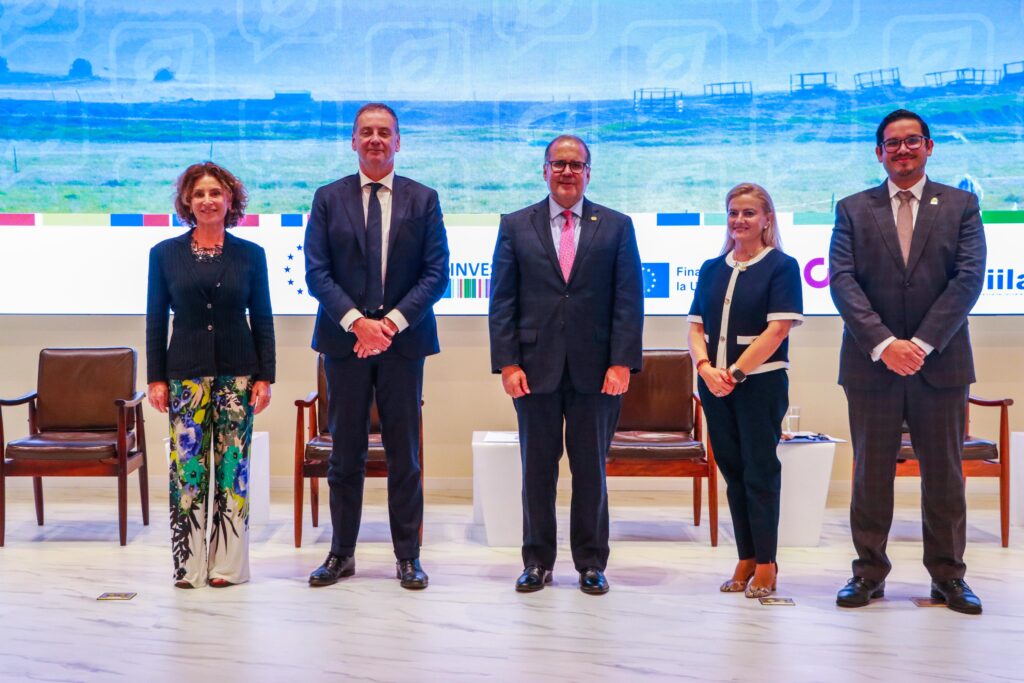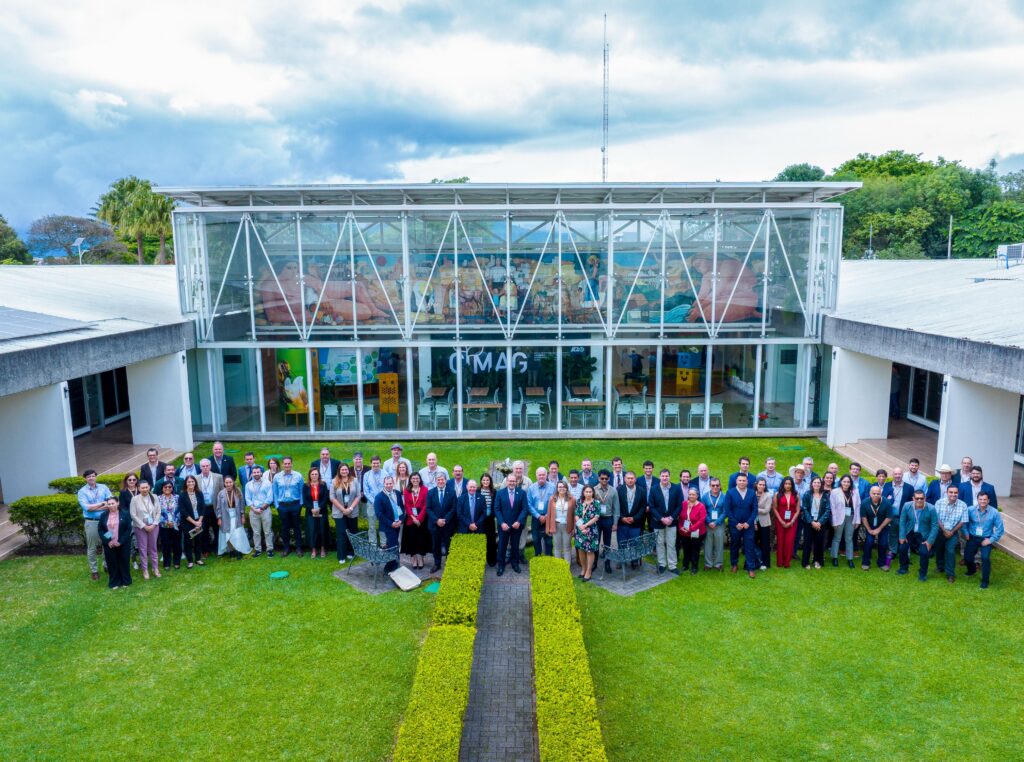
Antonella Cavallari, Secretary General of the International Italian-Latin American Organization; Felice Zaccheo, Head of Unit for Regional Programmes for Latin America and the Caribbean at the European Union’s Directorate-General for International Partnerships; Lloyd Day, Deputy Director General of IICA; Sonsoles Mories, Director of the Economic Development and Environment Division at the Foundation for the Internationalization of Public Administrations and Víctor Carvajal, Minister of Agriculture and Livestock of Costa Rica.
San Jose and Turrialba, Costa Rica, 4 July 2025 (IICA) – More than eighty public and private sector representatives from Latin America and the Caribbean held discussions with European Union officials on how to foster more sustainable livestock production systems, during a working meeting jointly organized by the EU’s AL-INVEST Verde program and the Inter-American Institute for Cooperation on Agriculture (IICA).
The II EU-LAC Agri-Food Dialogue took place over two working days—the first at IICA Headquarters in San Jose, Costa Rica, and the second at the Turrialba facilities of the Tropical Agricultural Research and Higher Education Center (CATIE).
AL-INVEST Verde is a European Union (EU) program, established primarily to promote sustainable growth and job creation in Latin America, supporting the transition towards a low-carbon, resource efficient and more circular economy.
Presiding over the launch of the meeting were Lloyd Day, Deputy Director of IICA; Felice Zaccheo, Head of Unit for Regional Programmes for Latin America and the Caribbean at the European Union’s Directorate-General for International Partnerships (DG INTPA); Antonella Cavallari, Secretary General of the International Italian-Latin American Organization (IILA); Sonsoles Mories, Director of the Economic Development and Environment Division at the Foundation for the Internationalization of Public Administrations (FIAP); and Víctor Carvajal, Minister of Agriculture and Livestock of Costa Rica.
Transition and financing
The opening panel discussion addressed perspectives on the sustainable transition of livestock systems in Latin America and the Caribbean and the EU Panelists included Andreas Pilzecker, Policy Officer of the European Commission’s Directorate-General for Agriculture and Rural Development (DG-AGRI), who spoke about methane emission mitigation strategies in agriculture in the European Union; Donald Moore, Executive Director of the Global Dairy Platform (GDP), whose presentation focused on responsible and sustainable food production in the livestock industry; and Diego Gauna, Technical Coordinator of the IICA-IDB Sustainable Livestock Platform, who addressed perspectives and characteristics of the transition in cattle livestock systems in Latin America and the Caribbean.
The Dialogue continued with panel discussions on financing models for sustainable livestock production and on technologies and productive practices for the scaling up of more competitive and sustainable livestock farming systems. Specialists from the EU Delegation in Costa Rica, the Inter-American Development Bank (IDB), as well as researchers and livestock experts spoke at both sessions.
The day’s proceedings ended with a discussion on strategic priorities for a sustainable transition, with participants issuing an appeal for the strengthening of joint efforts between the European Union and Latin America and the Caribbean.

More than eighty Latin American and Caribbean public and private sector representatives and European Union officials held discussions on sustainable livestock production systems, during a meeting jointly organized by AL-INVEST Verde and IICA.
Visit to CATIE
On the following day, the participants visited the CATIE facility in Turrialba. Luis Pocasangre, Director General of the prestigious research and educational center, highlighted the relevance of the meeting and recalled CATIE’s pioneering role in designing sustainable livestock policies and practices. “CATIE has worked for decades in the construction of sustainable livestock production models and this campus is a reflection of that effort,” he said.
On the other hand, Fernando Schwanke, Head of IICA’s Directorate of Projects, underscored the importance of the results of CATIE’s research on sustainable production and technologies for mitigation and the adaptation of agriculture in response to climate variability.
Finally, Emilio Calvo, Director of AL-INVEST Verde/ Component 2, stressed the value of the visit, noting that, “These opportunities promote deeper connections and more tangible learning”.
During the CATIE tour, the visitors were introduced to sustainable livestock production experiences, which included silvopastoral systems, live fences, fodder banks and landscape management practices aimed at reconciling productivity with environmental conservation.
More information:
Institutional Communication Division.
comunicacion.institucional@iica.int











